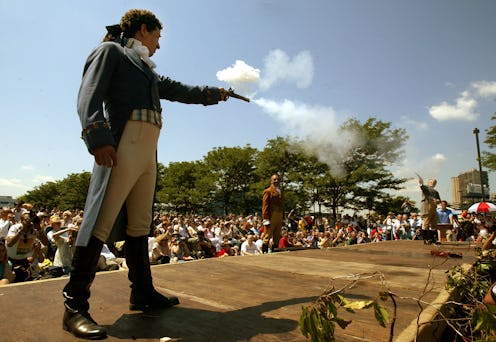News
Hamilton Electors Are Inspired By A Likely Source
There's a group of people trying to keep Donald Trump out of the White House. Technically his fate isn't sealed as president — that is only the case after the Electoral College votes on Dec. 19. Trump will need 270 electoral votes to become president, and there's a group of electors, including Democrats, who are organizing to ensure that doesn't happen, instead opting for a more palatable Republican choice such as Ohio Gov. and one-time Republican candidate John Kasich. The group has a name too. So, are Hamilton Electors really named after Alexander Hamilton?
These potentially faithless electors see themselves as fulfilling the role of the electors as explained by, yes, Alexander Hamilton. In The Federalist Paper No. 68, Hamilton spelled out why he thinks the Electoral College is so important, and the Hamilton Electors think it applies today to Trump:
The process of election affords a moral certainty, that the office of President will never fall to the lot of any man who is not in an eminent degree endowed with the requisite qualifications. Talents for low intrigue, and the little arts of popularity, may alone suffice to elevate a man to the first honors in a single State; but it will require other talents, and a different kind of merit, to establish him in the esteem and confidence of the whole Union, or of so considerable a portion of it as would be necessary to make him a successful candidate for the distinguished office of President of the United States.
It's oddly succinct how he speaks to our current political situation given that he wrote the words in March 1788. According to a piece in The New Yorker, that wasn't the first choice. They played around with the idea of the "moral electors" as being a step up from "faithless electors" before moving on to Hamilton Electors in honor of the founding father (it also can't hurt that Hamilton the Musical is so hot right now).
Originally the group was made up of seven Democrats, but there could now be at least one Republican convert too. Christopher Suprun of Texas wrote an op-ed in The New York Times on Monday explaining why he could not vote for Trump either, citing some of the same ideas about preparation and experience, and citing Hamilton's Federalist Paper No. 68. "The election of the next president is not yet a done deal. Electors of conscience can still do the right thing for the good of the country. Presidential electors have the legal right and a constitutional duty to vote their conscience," he wrote, also signaling Kasich as a good option.
Whether he and his fellow electors do the moral — or Hamilton — thing won't be known until at least Dec. 19 when voting happens in state capitols across the country.
